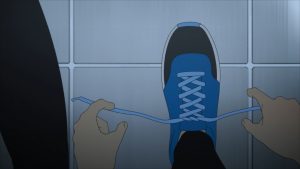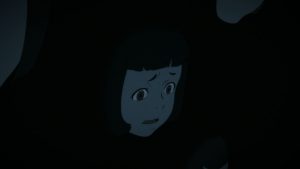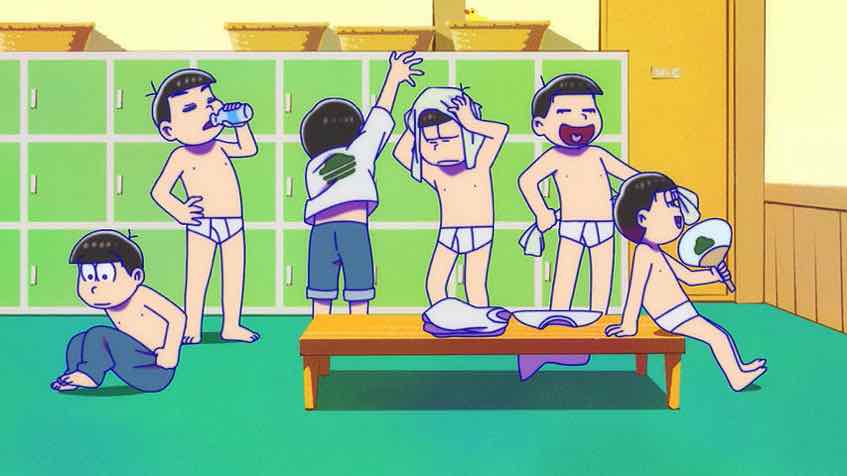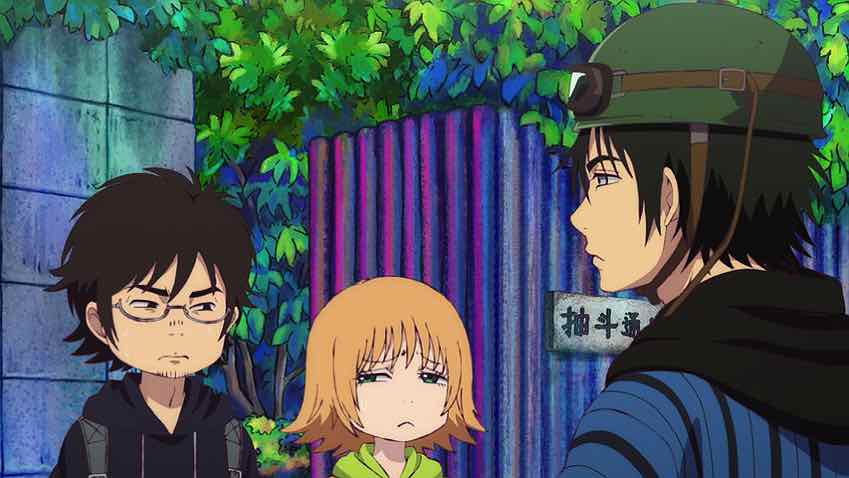Just a brief check-in with Devilman Crybaby, which I’m managing to squeeze an episode of in whenever I can. I’ve noticed that I usually have to psych myself up to watch this series, even though I find myself admiring something every time I do. It’s a striking display of talent on all fronts, but it’s so heavy and graphic that the experience is never what I’d call enjoyable. And it’s pretty unrelenting.
A good example: the scene where Young Dais‘ Kunkun launched into a rap to try and establish a bond with Mikiko was really great. Not only was the rap outstanding (as it always is in Devilman) but the whole thing was no emotionally powerful – this awkward kid falling back on his (unappreciated) skills to try and talk to the shy, self-doubt ridden girl he’s got a crush on. It makes the final scene of the episode that much more nauseating.
That’s the thing with Devilman Crybaby – I never feel like I can become emotionally connected to anyone or anything, because I know it or they will be ripped to pieces metaphorically or literally soon enough. The whole business with Akira’s parents was brutal, to be sure, but it’s just par for the course for this show. Akira seems sure to have everything dear to him destroyed sooner or later (some by him, no doubt) with Ryo standing by ghoulishly filming and grinning while it happens.
I will say this much – the first time I used dried bonito flakes (on okonomiyaki) I kind of freaked out myself, so I know where Taro is coming from. Intellectually I knew they weren’t alive, but damn – how can inanimate things move like that?






































Simone
February 15, 2018 at 9:39 amI’ll warn you, next episode is probably going to be the one that *might* get you the most to drop the show, and the one with the most troublesome scene. It also shows a glimpse of the best side of this show though (like the beautiful and heartfelt rapping scene – by the way, completely Yuasa-original material, as neither of these characters was even a thing in the original Go Nagai manga). But it’s from episode 6 onwards that really gets a chance to become prevalent, as finally the source material itself improves significantly, and so Yuasa has better stuff to work with.
However, it’s still depressing as fuck, there’s no getting around that.
カリ冶
February 15, 2018 at 3:09 pmAgain, I don’t understand how you can call the content ‘heavy and graphic’. Violence here is very cartoonish. I feel you should watch some sci-fi/horror OVAs and films from the 80s/90s to get a clear perspective. A timeless classics like ‘Akira’ has a more disturbing imaginary.
Anyway, yandere Ryo is a treat and a great improvement over the source material.
sonicsenryaku
February 16, 2018 at 2:25 amI hear ya Enzo; From your point of view, the series sort of feels like it rains tragedy on its characters (i.e. Akira) while somehow relishing in it at the same time (Ryo’s unsettling vouyerism). If my reading on this is right, from your perspective, if there was a lot more to the character writing, you’d at least feel invested enough in the tumultuous journeys of these characters to empathize with their plight, even if you still wouldn’t necessarily enjoy what you were watching. Your viewing investment would come from the love you had for the characters and wanting to see them make it through whatever horrific altercation they find themselves in. However, that emotional investment in the characters is not there which is why even though you can respect the skill of the work on display, it’s hard for you to get through the show. Without that investment being established within you, it feels like violence, sex, and tragedy are happening just for the sake of it. There is no well-conceived plight born from character drama or established personal narratives; bad shit is just happening and it just so happens that these characters are in a collision course with that bad shit.
It’s as you said in your first impressions, Devilman Crybaby is a sensory experience and it reflects the strong visual storytelling skills of Yuasa that i quite respect. The man has always been the kind of storyteller who assaults your senses with visual euphoria while still being able to articulate personal character narratives with his fervent direction and strong visual flair. He’s a director who i would associate with Satoshi Kon although I would never say he’s on that caliber (Satoshi Kon is just….man…..he really understood why anime/animation was such a special medium on both a psychological and metaphysical level, knowing exactly how to manipulate and utilize it to great effect; the man really was taken away from the world too soon). I say Yuasa reminds me off that perspicacious vision of Kon because he too also approaches narrative from that kind of surrealistic, sensory perspective. Devilman crybaby is certainly not his most visually inventive, but the directing is still top-notch and he is able to really run with the stuff he’s given here.
One thing i felt right of the bat while watching this series is that it felt to me like Yuasa was doing whatever he could to channel both himself and Go Nagai’s sensibilities simultaneously. In doing so, he has maximized what he believed to have been Nagai’s unrelenting vision with the manga while caressing the narrative with a more vulnerable center i.e. the crybaby part. What Yuasa has done here is take the characters of that manga and made them functional enough for him to be able to present them alongside the topical issues in today’s society he wishes to highlight. Devilman has never really been a character piece, so don’t expect layered characters or an exploration of psychological suppositions; the story has always meant to be a blistering paced cautionary tale. This is story constructed specifically to drag its viewer’s face into the vices, hedonistic clauses, and paranoia of mankind. It’s a narrative that comments on xenophobia and the parallels between it and fearing demons. It comments on corrupt industries; it takes a look into Japanese society and that of human social behavior in general. It’s the heightened sense of emotional arousal one receives after being put through all that is the crux of Devilman’s appeal. It’s what makes it iconic; what makes it the harrowingly effective tale that it is.
You know me long enough to know that ill always take a character focused narrative over a plot focused one any day; but i also appreciate when someone can meticulously craft something in a way that is oozing with enough style and creativity and can make me feel a sensation that is palpable and distinct. As I said, this is a series in which Yuasa seems to be more concerned with making the characters functional rather than engaging given what he has to work with from the manga (Miko gets close; I’d say she’s probably the most engaging character of the cast); still, he is able to mine some investment from the viewers in small but conducive ways. The small things like presenting Miki’s family socializing with one another, or Akira flirtatiously assuaging Miki’s concerns, or Miki’s genuine displays for Akira’s safety are ways that Yuasa orchestrates semblances of emotional connectivity between the viewer and the characters. It’s minimal compared to more character focused narratives, but it’s satisfactory because of how Yuasa crafts these moments. He understands the basic elements of human interaction and how to make such interactions feel relevant, even if those characters never grow beyond 2 dimensions.
As some comments have already highlighted, the show is gonna get wilder from here. The best way i can describe how devilman crybaby made me feel is that it stimulated multiple components of my mental core. Some of it was based on respect for such an auteur director, a bit of it being intrigue in the plot, a bit of it being a slight amount of emotional investment in the cast (if i was absolutely invested in the characters then maaaan would i truly sing this show a ton more praise), a good part of it being how the show feels like a throwback to the 80’s/90’s era of anime while being contemporary at the same time, and partly with how it goes about conveying its topical messages. All these different points of stimulation coalesced into a grand sensation; and it’s that inexplicable sensation that the experience left me with that i’ve interpreted as being a positive viewing experience. Yea, this is still an 8/10 for me
Mercesoul
September 21, 2022 at 12:04 amI dunno if you ever finished this show, but if you did, what did you end up thinking of it?
Guardian Enzo
September 21, 2022 at 6:36 amIt didn’t click with me, never finished it.